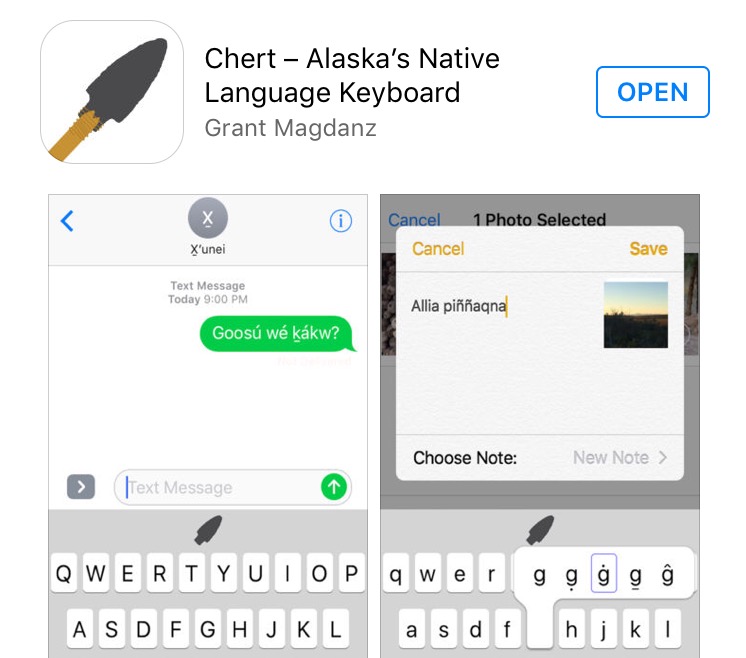Kotzebue brothers make first app for all 20 Alaska Native languages

When Barrow officially changes its name back to Utqiaġvik on December 1st, people all over are going to encounter the same typographical issue: writing out the “ġ” character.
Alaska Native languages have faced a growing technological challenge: meshing alphabets with all the new tools for communicating, like texting or Facebook. But as of Wednesday night, there’s now an app for that.
For the first time ever, you can find all the characters for the 20 recognized Alaska Native languages in one place: a keyboard, downloaded right onto your iPhone. An app called Chert pulls in all the characters you need to spell out words in Yupik, Iñupiaq, Tlingit and more.
Chert was designed by two brothers from Kotzebue, Reid and Grant Magdanz.
“Honestly, I think the main reason I wanted to do it is because I was trying to learn Iñupiaq,” Reid Magdanz said by phone in Kotzebue. “There’s all sorts of cool apps that you can put on your phone, but if you can’t type the characters right they’re not very useful.”
Magdanz was also frustrated he couldn’t text other language learners in proper Iñupiaq.
Language revitalization
So last Christmas, he and his brother Grant, who lives in California, spent a week making a similar keyboard just for Iñupiaq. It was a success, and over the last six months, the two expanded their efforts.
Magdanz, who works as a legislative staffer for Sitka Democratic house member Jonathan Kreiss-Tomkins, reached out to language experts around the state collecting the right characters for all the alphabets. Grant did the coding.
The brothers aren’t making money from the free app. They see it as a contribution to the state’s ongoing language revitalization. Magdanz explained that historically, colonial governments, educators and missionaries saw Alaska’s indigenous languages as “backwards,” simplistic and “anti-Modern” — a falsehood he thinks technology can correct.
“This app is kind of a small step, (but) it’s also something of a symbolically important one, because it is saying to the world not only can these languages be modern, but they are modern,” Magdanz said. “I mean, you can type them on your phone, you can text them, you can send a Snapchat. What’s more modern than that?”
The name Chert, came from a stone “traditionally used…to fashion spear points, arrowheads, and other tools,” Magdanz wrote in a message. He and his brother wanted a name that symbolized a connection between the “past and present,” a bit like the way a language connects speakers to the people who came before them. Unlike a spear point, this Chert takes just a few minutes to locate and install.
“You just go to the app store and search Chert,” Magdanz said.
So far they’ve only developed the app for the iPhone’s operating system, but they are working on one for Android devices as well.
Related stories from around the North:
Canada: Inuit-language movie named best Canadian film of all time by TIFF, Eye on the Arctic
Finland: English language dominance worries language teachers in Finland, Yle News
Greenland: (VIDEO) The importance of perserving the Inuit language, Eye on the Arctic
Norway: Sami languages disappear, The Independent Barents Observer
Sweden: Sweden to expand teaching of minority languages, Radio Sweden
Russia: More students in North Finland opting to study Russian, Yle News
United States: Arctic Alaskan city of Barrow votes to change name to Utqiagvik, Alaska Public Radio Network



